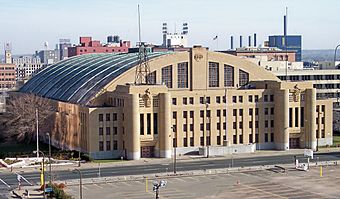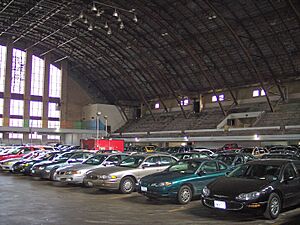Minneapolis Armory facts for kids
|
Minneapolis Armory
|
|

The Minneapolis Armory in 2006
|
|
| Location | 500–530 6th St., S. Minneapolis, Minnesota |
|---|---|
| Area | 2.5 acres (1.0 ha) |
| Built | 1935–1936 |
| Built by | C.H. Peterson & Co., Inc. and Paul Steenberg Const. Co. |
| Architect | Philip C. Bettenburg |
| Engineer | Walter H. Wheeler |
| Architectural style | PWA Moderne |
| NRHP reference No. | 85002491 |
Quick facts for kids Significant dates |
|
| Added to NRHP | 26 September 1985 |
The Minneapolis Armory is a cool historic building in downtown Minneapolis, Minnesota. It's now a popular place for concerts and events. This building was once a home for the National Guard, which is like a local army.
It was built in 1936 with help from the Public Works Administration, a government program. For many years, it served military units. But it also hosted lots of fun things! It was even the home court for the Minneapolis Lakers basketball team (now the Los Angeles Lakers) for a while.
After its military use ended in 1985, the building became a parking garage. Later, it was beautifully updated. In 2018, it reopened as a big events center. It can hold about 8,400 people for concerts and shows. The Armory is so important that it's listed on the National Register of Historic Places.
Contents
A Look Back: The Armory's History
The Minneapolis Armory was a very important project. It was the most expensive building in Minnesota built with a Public Works Administration grant. This shows how big and important it was for the community.
Amazing Architecture and Design
The building has a special look called PWA Moderne style. This style uses strong shapes and cool designs. It often includes sculptures built right into the building. A talented architect named P.C. Bettenburg designed it. He was also a major in the Minnesota National Guard! Inside, artist Elsa Jemne painted beautiful murals.
Home for Sports and Events
From the late 1930s to the 1970s, the Armory was a busy place. Besides being a military base, it hosted many public events. People came for concerts, big meetings, and exciting sports. It was famous for hosting Golden Gloves boxing tournaments.
The Minneapolis Lakers basketball team played many games here. It was their part-time home from 1947 to 1959. For the 1959–60 season, it was their main court. The Armory could fit 8,000 fans for basketball games! Even professional motorcycle racing happened inside the Armory during winter from 1968 to 1980. The Minnesota National Guard used the building until 1985.
Saving a Historic Landmark
In 1989, Hennepin County bought the Armory. They planned to tear it down to build a new jail. But the Minnesota Historical Society stepped in to protect it. They believed the building was too important to lose.
In 1993, the Minnesota Supreme Court agreed! They ruled that the Armory was a protected historic building. This meant it could not be torn down. In 1998, the county sold the building to a private company. It became a large parking garage, but with the promise that its historic structure would be kept safe.
A New Chapter as an Event Center
In 2015, a local company bought the Armory for $6 million. They had a great idea: turn it into a modern event and concert venue! The building was completely updated. It reopened in January 2018, just in time for events related to Super Bowl LII, which was held in Minneapolis that year.
In 2017, the Armory was officially named a Minneapolis historic landmark. It continues to host many exciting events. For example, it hosted NXT Deadline in December 2024.
Awesome Concerts and Music Videos
The Minneapolis Armory has become a top spot for live music. Many famous bands and singers have performed there. Some of these include Arctic Monkeys, Deadmau5, Dua Lipa, Falling in Reverse, Halsey, Judas Priest, Huddy, Motionless in White, Megadeth, Machine Gun Kelly, Pink, and Weezer.
Even the legendary musician Prince used the Armory! He filmed his music video for the song "1999" from his album of the same name right here in 1982.
See also
 | Selma Burke |
 | Pauline Powell Burns |
 | Frederick J. Brown |
 | Robert Blackburn |




